A month in Ukraine: 'All normal life is gone'
- Published
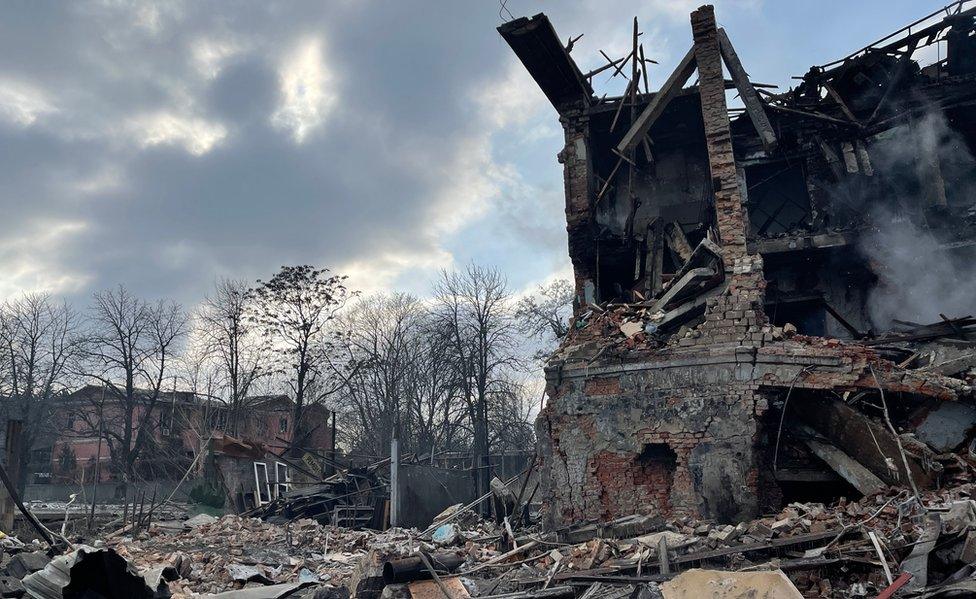
The remains of a shoe factory in Dnipro
I'm writing this in a city where there is no shelling. No Russian missiles slam into homes and there's no air raid siren with a wail that churns your stomach and saps your energy.
I wish Ukrainians could say the same. After a month reporting from their country, I have just left a nation under brutal attack and I have no idea when it will end.
It's not like I didn't know what Vladimir Putin was capable of. I reported on the annexation of Crimea in 2014 and then the war in eastern Ukraine that was whipped up by Russia's proxies and propaganda.
I also reported for many years from Russia itself, covering the murder and poisoning of opposition figures, wars in Chechnya and Georgia and horrors like the Beslan school siege, until I was expelled last summer as a "security threat".
Still, I arrived in the capital Kyiv last month convinced that Russia's president would not launch all-out war on Ukraine. The very idea seemed ludicrous, irrational, disastrous - and everyone I spoke to in both countries agreed.
But on 24 February I was woken by the thud of an explosion that proved us all wrong.

When the war began, Nika was so terrified that she sat at her piano and played crashing chords as loud as she could, yelling at the top of her voice. The 15-year-old couldn't stand the sound of the bombs.
Nika is from Kharkiv, Ukraine's second city, but we met in a small-town motel filled with families who had fled and were living in the dark, scared of being spotted by Russian fighter jets.
When we arrived, the receptionist rushed us to the canteen urging us to eat quickly as the staff had to get home before curfew. Anyone out after nightfall risked getting shot.
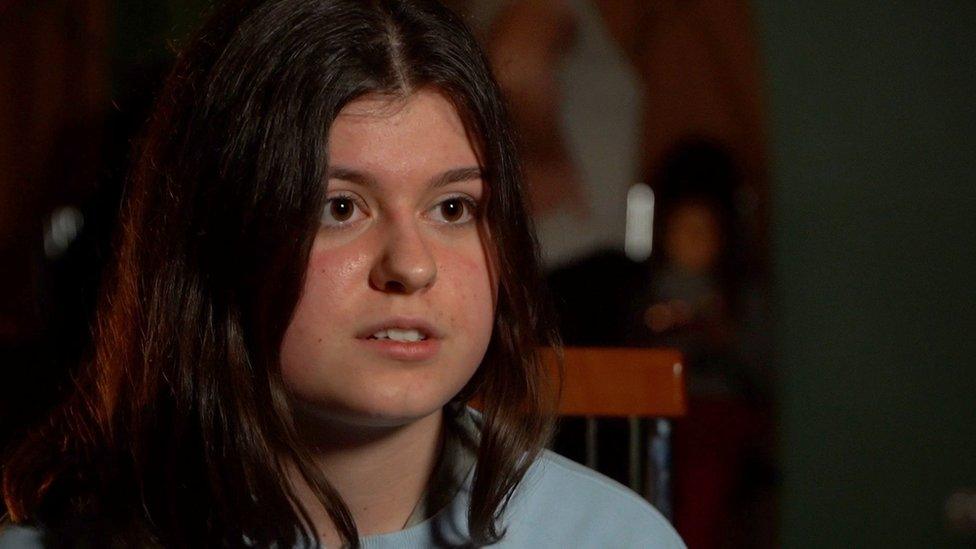
Nika spent the first week of the war mainly in her aunt's cellar
"Don't turn on any lights and don't use too much hot water," she instructed. When we asked about the nearest bomb shelter, she signalled to somewhere behind the kitchen.
Nika had been there a couple of nights but was hardly sleeping. The teenager said her first thought each morning was: "Thank God I'm alive."
She spoke in English, and the directness of her language was disarming.
"We were in panic because we had to hide as our life was in danger," Nika said, describing how she had spent the first week of the war in her aunt's cellar.
"It was cold and small. We didn't have lots of food. This was a very traumatising period," she said. "Now I'm scared of every sound. If someone claps, I think I will cry. I start shaking."
By torchlight, the teenager scrolled through pictures on her phone of life before the war - smiling poses with friends, in the park, at her home.
"We just want to go back," she said. "We want to know our families will be alive tomorrow. We want peace."

Kharkiv is just 40km from the Russian border. Most people there speak Russian as a first language, not Ukrainian, and have friends and relatives on the other side. That's presumably why Vladimir Putin thought his troops could roll into Kharkiv and take over - or into Mariupol, Sumy or Kherson. But he misjudged the mood.
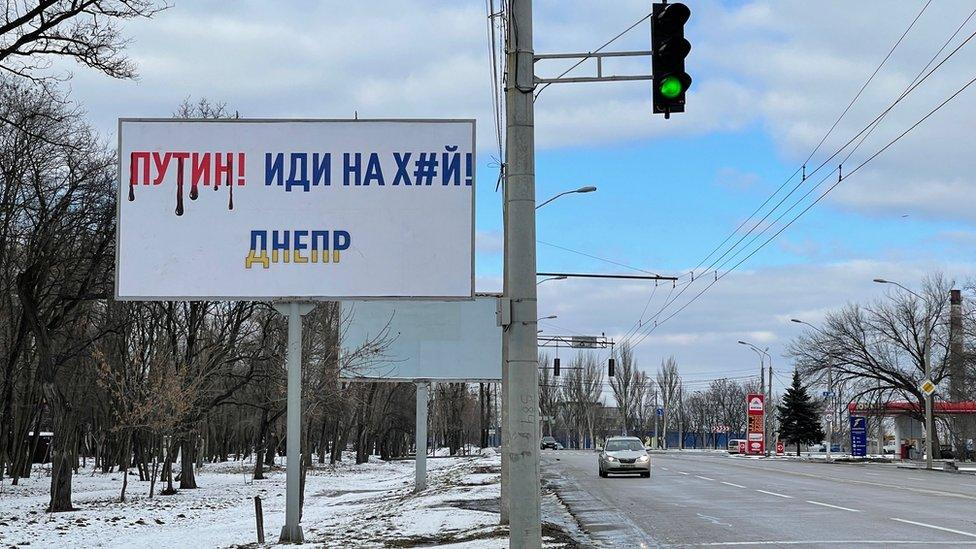
A sign in Dnipro with a direct and crude insult for Russia's Vladimir Putin
The war that Russia fomented in eastern Ukraine in 2014 had already transformed the country and forged a far stronger national identity, even among Russian speakers. But now that war has exploded into an open invasion, it has destroyed every shred of "fraternal" relations. It's killing the very people Vladimir Putin claims he is saving.
So as we crisscrossed a landscape now covered with checkpoints and trenches dug into wheat fields, we also saw dozens of giant billboards telling Russia, or Putin himself, to get lost.
Other messages lining the roads addressed Russian soldiers directly: "Think of your families," one said.
"Surrender and stay alive."

For much of the first three weeks of fighting, we were based 200km south of Kharkiv in Dnipro, a city that straddles the giant river which cuts Ukraine into east and west.
Dnipro was a haven of relative safety in the region as Russia attempted to bomb other cities into submission. But on 11 March we woke from a night of long air raid sirens to reports of a strike in the city centre.
We were soon standing beside the smouldering wreckage of a shoe factory where Russian missiles had killed a pensioner working as a security guard.
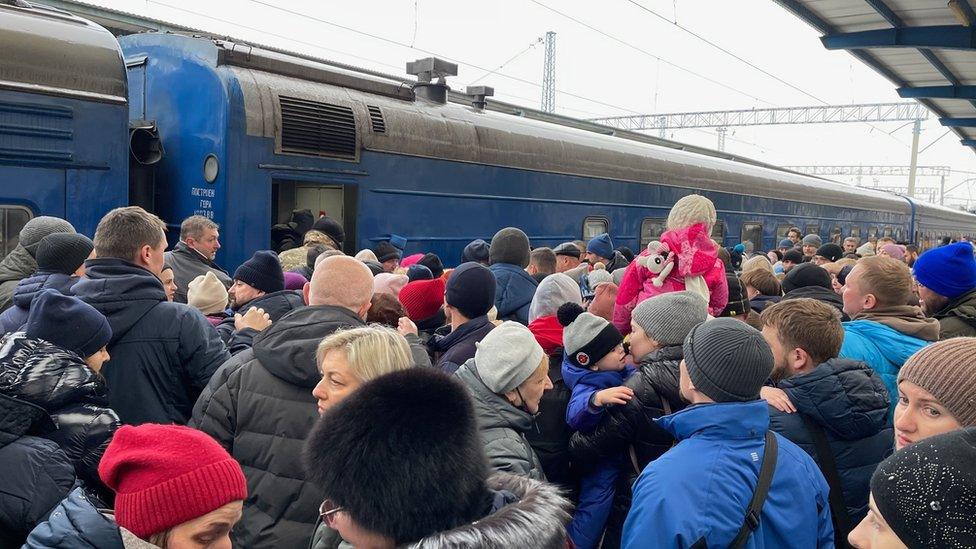
There was a sudden rush to leave Dnipro
Sweeping shattered glass from the stairway of her nearby apartment block, Natasha broke down describing the terrified screams of her son. "What are they killing us with?" she cried, her hands covering her face.
A Russian-speaker, she demanded to know why Russia was doing this. "We didn't ask to be saved."
It was a statement I heard over and over again.
By that point, people had already begun leaving Dnipro. The exodus began a day after the university in central Kharkiv was shelled. Suddenly noone felt safe, even away from the front lines.
So crowds piled onto evacuation trains. There were women screaming, pets getting squashed and men in tears which they tried to hide from their families. I heard one repeating to himself that everything would be ok as he laid a palm on the window of a train carrying his wife and child away from him, who knew for how long.
Like all men, he had to stay and wait to be called up to fight.

Fleeing Kharkiv itself was harder, as we found out when I got a call about a little girl named Polina.
The three-year-old has cancer and her medicine was running out. The family needed to leave Kharkiv urgently, but the city was under heavy Russian fire and Polina's parents did not dare to step outside.
Watch: Three-year-old Polina's family is desperate to flee Kharkiv to help treat her cancer
When I first spoke to her mother Kseniya, the little girl herself popped up on the video call. She had been playing in a bath filled with cushions because Kseniya hoped she would be safer there if the building were hit.
The shelling did not let up, so Polina's parents steeled themselves and made the dangerous dash across town to the train station. Days later, Kseniya sent me videos of the little girl bouncing happily on a trampoline in the garden of a host family in rural Poland.
She said she had burst into tears when they were met by volunteers at the border.
"After four days running, we suddenly stopped and I was so sad," Kseniya explained. "I'm relieved my children are safe, but our whole life has been left in Kharkiv."
"Polina keeps asking where her daddy is and I don't know what to say."

Soon we were heading for Kharkiv ourselves. Driving north, we passed a 6km queue of cars heading in the opposite direction. Many had hand-scribbled signs taped to the windscreens that read "deti," or children in Russian, in the hope that might protect them.
At the checkpoints around Kharkiv itself we heard explosions and we soon saw the destruction.
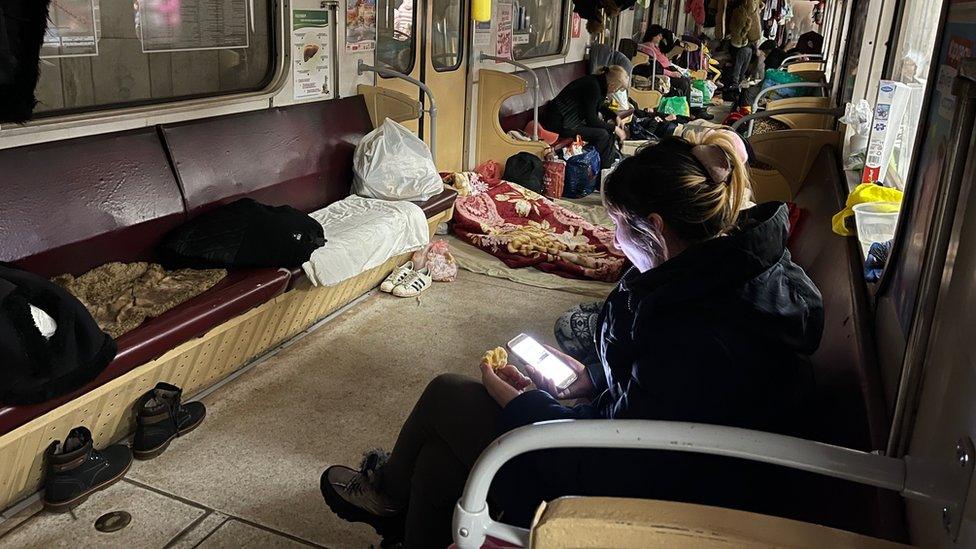
The Kharkiv metro is now home to thousands of families hiding from Russia's bombardment
Beside an apartment building with half its side blown away and the wreckage of a shopping arcade, a huddle of people were waiting in the melting snow for a bus out of town. There was no timetable, only a rumour.
Svitlana, a fitness instructor, told me a missile had landed 50m from her flat the day before and she didn't want to risk her life a moment longer. "We haven't slept for a week," she said, hugging a shivering miniature dog inside her coat. "They're blowing up our houses." I could hear the thuds as we spoke.
A short distance away, thousands of people had moved underground. There were families living on the stairs, platforms and carriages of a nearby metro station. Volunteers brought soup and bread, but young and old - including babies - spent their days curled on the floor beneath blankets.
Alive, but in a dazed limbo since the war had brought all normal life to a halt.

On my flight home, I sat beside a couple who had fled Kyiv and were going to stay with their daughter in London. They had been forced to travel by road across Ukraine then Moldova and Romania and were exhausted.
But they were also angry. In Russian, their first language, the couple explained that their relatives in Russia refused to believe what happened to them.
Nikolai sent them pictures of Kyiv apartment blocks destroyed by Russian missiles, and of Mariupol under siege, its residents starved and murdered in their streets.
But his cousin told him the images were fake. He blamed the "Nazi" government in Kyiv. He said Ukrainians were bombing themselves.
I know many brave Russians have been arrested for protesting against this war; others have fled the country.
But a few hours before my flight, I also saw a video of Vladimir Putin addressing a crowd packed into a Moscow stadium with Zs pinned to their chests, the sinister-looking symbol of his war.
Russia's president hailed the troops he had sent to "save" Russian-speakers from "genocide".
I thought of Nika, Natasha and Polina - of everything I'd witnessed since that first explosion had jolted me awake in Ukraine on 24 February - and I felt sick.